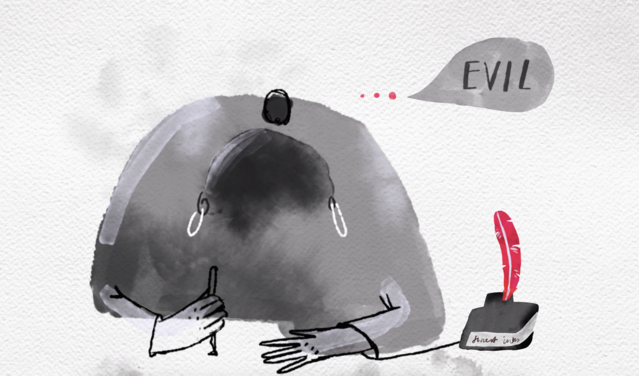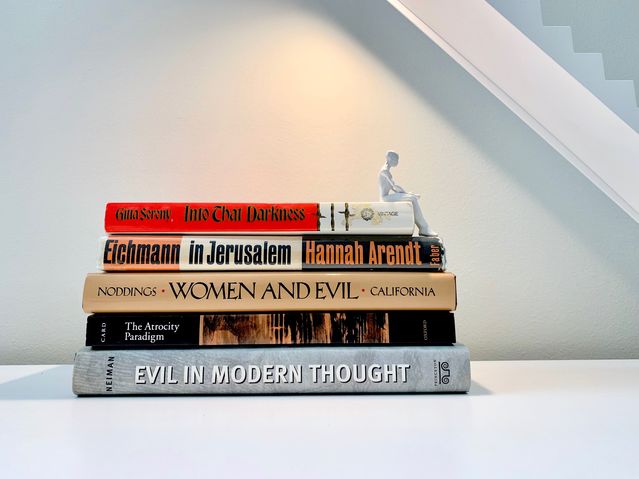
Ethics and Morality
Five Books on Evil Written by Incredible Women
These female authors forever changed how we think about evil.
Posted January 31, 2019

If you look at the bestselling books from the past decade, you might come to the false conclusion that only men are interested in evil. I'm hoping to smash that stereotype with my own book on why people do bad things, Making Evil: The Science Behind Humanity's Dark Side. But it's still disheartening to look around and see men, men, and more men.
Authors like Simon Baron-Cohen, Paul Bloom, Philip Zimbardo, Adrian Raine, Lars Svendsen, and Steven Pinker guide us into the world of psychopaths, violence, murder, and criminality. These are all great authors, but can we really get a true sense of how we should think about evil if we only learn about it from a male perspective? I think not.
For that reason, I am pleased to give you five influential books on evil written by women over the past few decades with some of my favorite excerpts.

1. Hannah Arendt. Eichmann in Jerusalem: A Report on the Banality of Evil (1963)
A political and philosophical exploration, and one of the most famous and controversial books on evil written in the 20th century.
Arendt's incredible portrayal of the trial of notorious Nazi Adolf Eichmann has earned her a permanent place in any self-respecting bibliophile's library. With decades of writing on and around the topic of evil, Arendt showed the world that evil could be banal and committed by ordinary people. She stressed that not just individuals, but also broken systems and totalitarian regimes are to blame for heinous acts. Arendt argued that because evil can manifest anywhere, we must exercise our free will and fight against it.
"...under conditions of terror most people will comply but some people will not, just as the lesson of the countries to which the Final Solution was proposed is that "it could happen" in most places but it did not happen everywhere. Humanely speaking, no more is required, and no more can reasonably be asked, for this planet to remain a place fit for human habitation."
—Hannah Arendt
2. Susan Neiman. Evil in Modern Thought: An Alternative History of Philosophy (2002)
A western philosophical exploration of the core concept of evil, making us question where our morality comes from.
In this rigorous text, Neiman takes us through various conceptualizations of evil—from the Book of Job, through the 1755 Lisbon earthquake, to the Holocaust and 9/11. But Neiman didn't set out to define what evil is, rather she asked to understand the philosophical, religious, and psychological path that leads to us to the perception of morality we have today. She asked difficult questions about why we are so sure about our own moral compass, given that morality varies across time and culture. Neiman laid out how our perception of evil always has, and always will, touch every aspect of our lives.
"If designating something as evil is a way of marking the fact that it shatters our trust in the world, it's that effect, more than the cause, which I want to examine... to explore what changes in our understanding of the problem of evil reveal about changes in our understanding of ourselves, and of our place in the world." —Susan Neiman
3. Claudia Card. The Atrocity Paradigm: A Theory of Evil (2002)
On the hunt for a new definition of evil, this philosophical manifesto tears into famous philosophers like Kant and Nietzsche.
Decades of thinking and teaching on the topic of evil gave Card's writing a deeply informed perspective. At the heart of her work was the argument that the concept of evil is worth preserving, and that we need to pay attention to evils that occur so often that they are easily overlooked. She proposed a definition of evil with two basic components; intolerable harm and culpable wrongdoing. Card also argued that we are not all potentially evil, rather evil people have a fundamental character flaw. She argued forcefully that we need the term evil to understand and prevent atrocity.
"Historians and psychologists justifiably probe the causes of evildoing, with the aim of helping future generations avert some of the worst consequences of past errors and ignorance... it is all the more important that philosophers also consider how we may better live with that knowledge and with the aftermath of evils we fail to prevent or escape." —Claudia Card
4. Nel Noddings. Women and Evil (1989)
A feminist exploration of evil, with a considered way of bringing female ideas and voices into this traditionally male topic.
Noddings argued that evil was for too long looked at through male interests and male experiences (hear, hear!). Writing from a second-wave feminist perspective, she tried to redress this inequality. Noddings brought feminism and women's perspectives into her morality of evil and criticized the historical categorization of disobedient women as evil women, or she-devils. She ultimately posited that we need to better understand fear, separation, and helplessness—all traditionally feminine traits—in order to truly understand evil.
"Women have until recently been relatively silent on evil... Women who have attempted to speak on moral matters have often been effectively silenced by the accusation that speaking and thinking on such things automatically separates them from the feminine principle and thus their only claim to goodness" —Nel Noddings
5. Gitta Sereny. Into that darkness: An examination of conscience (1974)
An investigative journalist explores whether we are born evil by examining Nazi extermination camp Kommandant Franz Stangl.
Among the first to do so, Sereny wrote a number of works unmasking Nazis and forcing us to see them as human beings. She argued that moral monsters are not born, rather they are a product of an environment which interfered with their growth as human beings. On the surface, Sereny provides us with an in-depth portrait of Stangl, a man sentenced to life imprisonment for his role in the murder of 900,000 people at Treblinka. But, really, she used this case as a way to teach us the importance of asking how human beings succumb to and resist evil, and that we are all ultimately responsible for our own actions.
"...deeply relevant to the pressures and perils which beset us now and may threaten us in the future. I thought it essential... to try at least once, as far as possible unemotionally and with an open mind, to penetrate the personality of a man who had been intimately involved with the most total evil our age has produced... not from our point of view, but from his."
—Gitta Sereny



